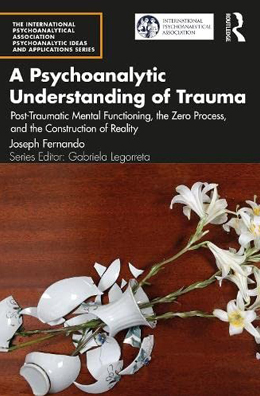
Presenter: Joseph Fernando, MD
Wednesday, March 20, 2024: 7:30 pm – 9:30 pm (no break)
TPS Scientific Meeting: Open to All (*Fee may apply. See below.)
** DISTANCE PARTICIPATION ONLY – Registration deadline is one week prior to the meeting. Preregistration is required.
This paper explores the links between trauma, guilt, and the superego, and through this exploration attempts to make some additions to our understanding of individual dynamics, group regression, and group delusions. The author first describes his concept of the zero process as the form of mental functioning that is a product of the breakdown of the construction of the present moment during trauma. These unconstructed, bits and pieces memories exist as present experiences or future expectations. From time to time, in relation to traumas that are either individual or developmental, inner objects which have the quality of immediate presences form — we usually call them introjects. The author suggests that these are best conceptualized as zero process structures in having many characteristics of the zero process, and that the obligatory connection between trauma and guilt, and the manner of transmission of culture and the superego, and of conspiracy theories and other group delusions, can be better and more deeply understood once the part that zero process structures play in all these phenomena is brought into focus.
A Psychoanalytic Understanding of Trauma: Post-Traumatic Mental Functioning, the Zero Process, and the Construction of Reality is available at Caversham booksellers: https://www.cavershambooksellers.com/item/9781032254425
Learning Objectives:
At the end of this presentation participants will be able to:
- Describe the basic characteristics of the zero process, and identify them in their clinical work.
- Describe how zero process characteristics manifest in such internal structures as introjects and the superego.
- Describe how the zero process aspects of the superego explain its ability to stand apart from the person and master them.
- Describe how the zero process aspects of the superego explain its intergenerational transmission and its relation to shared group delusions.
Recommended Readings (not required):
Fernando, J. (2018a). Trauma and the Zero Process: Clinical Illustrations. Psychoanalysis, 29: 37-45.
https://doi.org/10.18529/psychoanal.2018.29.3.37
Fernando, J. (2018b). Trauma and the Zero Process: Theoretical Considerations. Psychoanalysis, 29: 46-53.
https://doi.org/10.18529/psychoanal.2018.29.3.46
Fernando, J. (2023). A Psychoanalytic Understanding of Trauma: Post-Traumatic Mental Functioning, the Zero Process, and the Construction of Reality. London, UK: Routledge.
* Registration/RSVP
Please note that there is a $35.00 fee for participants who are not CPS members, TPS Affiliate/Guests or TIP Candidates.
CPS members, TPS Affiliate/Guests or TIP Candidates – Please RSVP by email to info@torontopsychoanalysis.com.
Joseph Fernando, MD
Joseph Fernando, MD is a training and supervising analyst at the Toronto Institute of Psychoanalysis, and Director of the Toronto Institute of Psychoanalysis. He has been in private practice of psychotherapy and psychoanalysis for over 30 years in Toronto. Dr. Fernando has published papers on guilt, narcissism, the character of the exception. His book, The Processes of Defense, won the 2010 Gradiva prize for a book on psychoanalytic theory. His second book, A Psychoanalytic Understanding of Trauma: Post-Traumatic Mental Functioning, the Zero Process, and the Construction of Reality was recently published by Routledge in the IPA ideas and applications series. He is presently at work on a book on the deeper links between trauma, guilt, and the the superego, which attempts to throw some light on issues of cultural transmission and group delusions. He has presented widely on his ideas in North America and abroad.
This event is eligible for Section 1 CME credits (0.5 credits/hour). This event is an accredited group learning activity (section 1) as defined by the Maintenance of Certificate Program of the Royal College of Physicians and Surgeons of Canada, approved by the Canadian Psychiatric Association (CPA). The specific opinions and content of this event are not necessarily those of the CPA, and are the responsibility of the organizer(s) alone. As per the Royal College standard, each presentation provides a minimum of 25% interactive learning.
For more information about and for registration in the tps&i Extension Programs, Scientific Meetings, Training Programs, Study and Supervision groups and Special Presentations, please visit our website: torontopsychoanalysis.com or email info@torontopsychoanalysis.com
